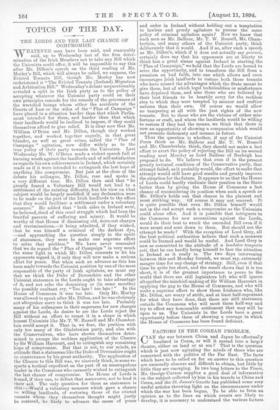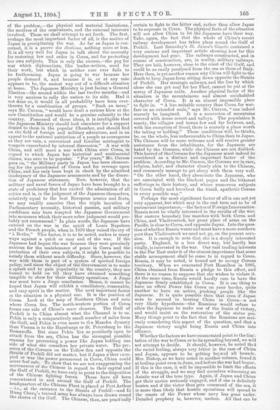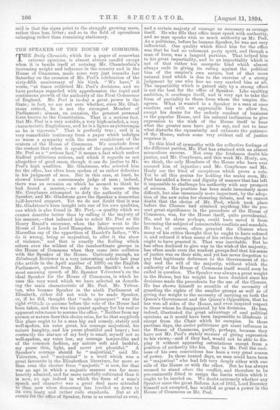FACTORS IN THE COREAN PROBLEM.
CAN the war between China and Japan be effectually localised in Corea, or will it spread into a larger theatre, either on land or at sea ? That is the question which is just now. agitating the minds of those who are concerned with the politics of the Far East. The facts which have to be relied on for an answer to this question are unusually obscure and difficult to obtain, but little by little they are emerging. In two long letters to the Times, Mr. George-Curzon supplies a good deal of information on the subject collected by him in his travels in China and Cores, and the St. James's Gazette has published some very useful articles throwing light on the circumstances under which the war has been begun. To be able to form an opinion as to the lines on which events are likely to develop, it is necessary to understand. the various factors of the problem,—the physical and material limitations, the motives of the combatants, and the external interests involved. These we shall attempt to set forth. The first, perhaps the most important factor of all, is the motive of Japan in precipitating the war. As far as Japan is con- cerned, it is a guerre des elections, nothing more or less. It is all very well for Japan to talk about the necessity for restoring law and order in Corea, and for protecting her own subjects. This is only the excuse,—the peg for war which diplomatists, like leader-writers, need for their work, but which in neither case ever fails to be forthcoming. Japan is going to war because her people demand it, and because it is, or at any rate appears to be, the easiest way out of a difficult situation at home. The Japanese Ministry is just facing a General Election—the second within the last twelve months—and is very anxious to rally the nation to its side. Had it not done so, it would in all probability have been over- thrown by a combination of groups. "Such an issue," says Mr. Curzon, "would have dealt a serious blow at the new Constitution and would be a genuine calamity to the country. Possessed of these ideas, it is intelligible that the Japanese Ministry should look elsewhere for a support denied to them in the popular Chamber, and should find on the field of foreign and military adventure, and in an appeal to the national patriotism of a people as courageous as they are vain, a convenient and familiar astringent to tempers exacerbated by internal dissension." A war with China, and still more a war with China over Corea, in regard to which Japan has historical and sentimental claims, was sure to be popular. "For years," Mr. Curzon goes on, "the Military party in Japan has been clamour- ing for the punishment of Corea, and for revenge upon China, and has only been kept in cheek by the admitted inadequacy of the Japanese armaments and by the discre- tion of Japanese statesmen. Now, however, that the military and naval forces of Japan have been brought to a state of proficiency that has excited the admiration of all critics and is, in the judgment of the Japanese themselves, relatively equal to the best European armies and fleets, we may readily conceive that the triple incentive of Parliamentary necessity, historical passion, and military confidence may have tempted the Japanese Government into measures which their more sober judgment would pro- bably not recommend." In plain words, the Japanese have entered on the war in the spirit of Louis Napoleon and the French people, when in 1870 they raised the cry of 'L Berlin." This factor, it is to be noted, makes in many ways against a quick or easy end of the war. If the Japanese had begun the war because they were genuinely anxious for the maintenance of peace in Corea and the protection of their own subjects, it might be possible to eatisfy them without much difficulty. Since, however, the war with them is part of a system of spirited foreign policy, and since the object of the Government is to make a splash and to gain popularity in the country, they are bound to hold on till they have obtained something tangible to show for their military operations. A Jingo war must have a Jingo conclusion. Hence, it cannot be hoped that Japan will exhibit a conciliatory, reasonable, and easy spirit in the matter. The next important factor in the situation is a physical one. It is the position of Corea. Look at the map of Northern China and note where Corea lies. The north-western portion of Corea forms one side of China's mare elausum. The Gulf of Pechili is to China almost what the Channel is to us. Pekin is only a comparatively small number of miles from the Gulf, and Pekin is even more to the Manchu dynasty than Vienna is to the Hapsburgs or St. Petersburg to the Romanoffs. But since Pekin lies so peculiarly open to attack from the sea, China has the strongest possible reasons for preventing a power like Japan holding one side of what she considers her private water. The pre- sence of the Coreans on the Yellow Sea and opposite the Straits of Pechili did not matter, but if Japan ether occu- pied or was the power paramount in Corea, China could never feel safe. To show that we are not exaggerating the nervousness of the Chinese in regard to their capital and the Gulf of Pechili, we have only to point to the disposition of the Chinese fighting forces. These have all been concentrated in and around the Gulf of Pechili, The headquarters of the Chinese Fleet is placed at Port Arthur —i.e., at the entrance to the Straits of Pechili—and Li Hung Chang' trained army has been drawn round the shores of the Gulf. The Chinese, then, are pract'cally certain to fight to the bitter end, rather than allow Japan to be supreme in Corea. The physical facts of the situation will not allow China to let the Japanese have their way. Take, again, the fact that the whole of China's recent railway development has taken place round the Gulf of Pechili. Last Saturday's S. ,Tantes's Gazette contained a very curious and important article showing how far this development had gone. The railways constructed, and in course of construction, are, in reality, military railways. They are laid, however, close to the coast of the Gulf, and could be as easily paralysed from the sea as those of Italy. Here then, is yet another reason why China will fight to the death to keep Japan from sitting down opposite the Straits of Pechili. Her strategic railways, and the line by which alone she can get coal for her Fleet, cannot be put at the mercy of Japanese raids. Another physical factor of the situation is the mountainous and almost uninhabited character of Corea. It is an almost impossible place to fight in. "A less suitable country than Corea for war- fare on an extended scale," says Mr. Curzon, "can indeed scarcely be imagined. It is a succession of mountains covered with dense covert and valleys. The population /a scanty, the villages and towns few and far between, and, with the exception of Seoul, there is scarcely a place worth the taking or holding." These conditions will, he thinks, be, on the whole, less unfavourable to China than to Japan. The Chinese will be more welcome and will receive greater assistance from the inhabitants, for the Japanese are hated by the Coreans, while the Chinese are not disliked. This hatred of the Coreans for the Japanese must indeed be considered as a distinct and important factor of the problem. According to Mr. Curzon, the Coreans are in race, religion, habit, and character closely akin to the Chinese, and commonly manage to get along with them very well. "On the other hand, they abominate the Japanese, who are associated with the blackest pages and the bitterest sufferings in their history, and whose numerous subjects in Corea, bully and browbeat the timid, apathetic Corean in every possible way." Perhaps the most significant factor of all is one not yet very apparent, but which may in the end turn out to be of paramount importance,—the factor of ForeignIntervention. Russia most be vitally interested in the results of the war. Her eastern boundary line marches with both Corea, and China, and Vladivostock, her great place of arms on the Pacific, is close to Corea, and opposite Japan. Into the ques- tion of whether Russia wants and must have a more southern port than Vla.divostock we need not go, on the present occa- sion. It is enough to note that she is a deeply interested party. England, in a less direct way, but hardly less vitally, is interested in the war. Our vast trading interests in the Far East make it of the utmost importance that some stable arrangement shall be come to in regard to Corea. Russia, it may be noted, is bound not to occupy Oman territory. When we evacuated Port Hamilton in 1885, China obtained from Russia a pledge to this effect, and there is no reason to suppose that she wishes to violate it. At the same time, Russia would hardly care to have the Japanese firmly established in Corea. It is one thing to have an effete Power like Corea on your border, quite another to have an active, pushing people like the Japanese. It is quite possible then that even if Japan were to succeed in beating China in Corea—a not very likely hypothesis—the Russians would refuse to allow the Japanese to make use of the fruits of victory, and would insist on the restoration of the status quo. Many things point to the fact that the Russians are seri- ously considering this aspect of the question, and that a Japanese victory might bring Russia and China into alliance.
Whether the factors we have enumerated point to the limi- tation of the war to Corea or to its spreading beyond, we will not attempt to decide. It should, however, be noted thht the racial feeling, always very bitter in the case of China and Japan, appears to be getting bet ond all bounds. Mrs. Bishop, as we have noted in another column, found it at boiling-point even in June, and before the war had begur. If this is tie case, it will be impossible to limit the effects of the struggle, and we may find ourselves witnessing an Asiatic war of the true type. Again, if Japan and China i get their navies seriously engaged, and f one is definitely beaten and if the victor thus gets command of the sea, it is more than likely that hostile operations will spread to the coasts of the Power whose navy has gone under. Detailed prophecy is, however, useless. All that can be said is that the signs point to the struggle growing more, rather than less, bitter ; and so to the field of operations enlarging rather than remaining stationary.




































 Previous page
Previous page